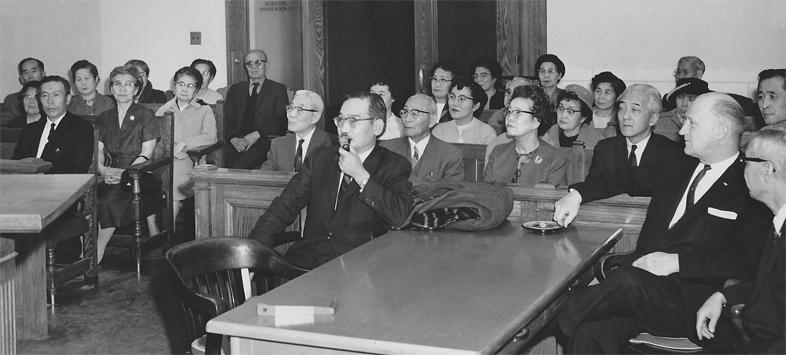
Equality for all was a life-long mission for attorney Minoru Yasui, one of a handful of Japanese-Americans leading the U.S. Supreme Court battle against World War II exclusion and internment.
After the war, Min settled in Denver and enjoyed a long, celebrated career with the city. He died in 1986 and Denver Mayor Michael Hancock has proclaimed Sept. 10 "Minoru Yasui Day."
His daughter, Holly, and niece, Robin, spoke with Colorado Matters' Andrea Dukakis. Click on the audio link to hear the conversation. Read edited highlights below.
Robin on what happened the evening of March 28, 1942:
"Min was a young lawyer and the first Japanese American to graduate from the University of Oregon law school. He heard this proclamation, which singled out Japanese, German, Italian immigrants and Japanese-American citizens to be placed under a curfew as they were deemed to be potentially dangerous enemy aliens to the United States. And because it included Japanese-American citizens, this was to Min, absolutely a violation of constitutional rights. He was not going to stand by and see that happen. So he decided to make a test case of himself. And got himself arrested by blatantly violating the curfew, so he could take it to court and challenge this order."
Holly on what Min was like as a dad:
"He went to meetings everyday after dinner -- he always came home for dinner. My mom was his secretary, and on weekends we often went down to his office on Larimer Street... and played in the back rooms. ... I didn't realize that everybody's dad did not go to meetings after dinnertime and that everybody didn't go downtown with their parents. So I never considered him to be anything but the best dad."
Robin on Min's main motivation behind his activism:
"This was never about him. This was always about asking the government that he loved -- the U.S. government -- to uphold its ideals, to do the right thing. This was, in his mind, a way to ask our government to be accountable, to protect the constitutional rights of its people."
Holly on what Min might say about civil rights issues in the U.S. today:
"I think he would say that we have to keep on -- that we have to keep ever vigilant in the course and the community. We have to continue to organize, to work together. And one of the things he's said, 'What damages or hurts any of us, damages and hurts all of us.'"
More:
- Find out about the various projects and 2016 centennial celebrations of Min's birthday organized through the Minoru Yasui Tribute Project.
- There's additional information about Yasui's activism, both nationally and in Colorado, in the Densho Encyclopedia.
- Watch "Citizen Min," a short 1983 profile of Yasui produced at KUTV, the NBC affiliate in Salt Lake City, Utah .








